(完整版)必修三unit2语法讲解情态动词用法
- 格式:docx
- 大小:20.30 KB
- 文档页数:5
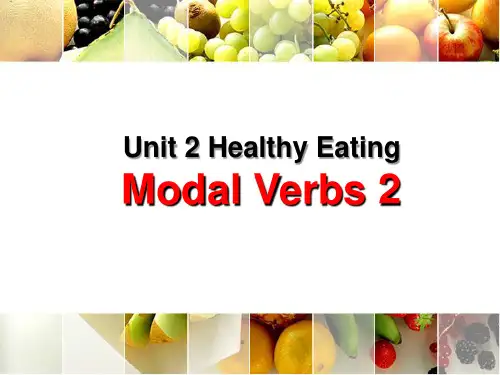
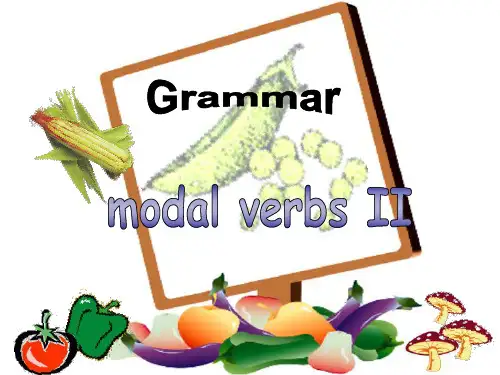

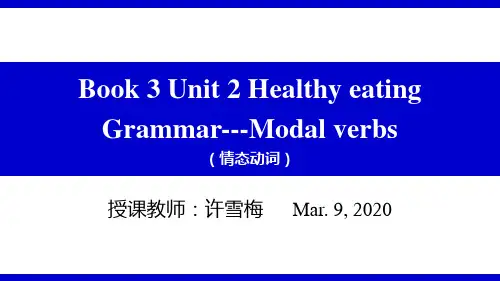
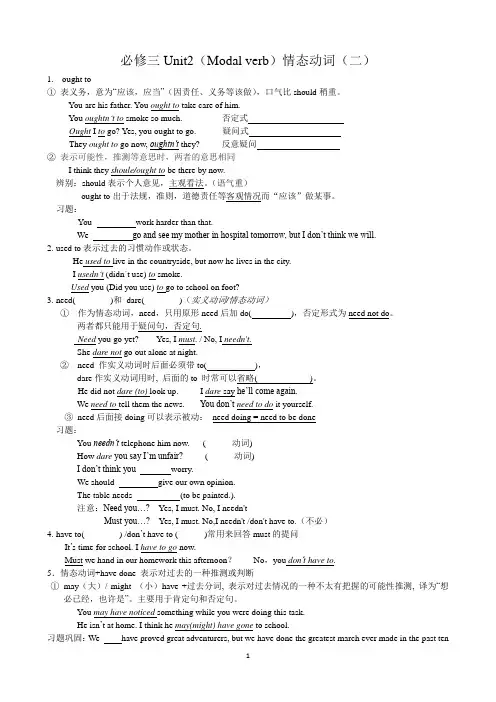
必修三Unit2(Modal verb)情态动词(二)1.ought to①表义务,意为“应该,应当”(因责任、义务等该做),口气比should稍重。
You are his father. You ought to take care of him.You oughtn´t to smoke so much. 否定式Ought I to go? Yes, you ought to go. 疑问式They ought to go now, oughtn’t they? 反意疑问②表示可能性,推测等意思时,两者的意思相同I think they shoule/ought to be there by now.辨别:should表示个人意见,主观看法。
(语气重)ought to出于法规,准则,道德责任等客观情况而“应该”做某事。
习题:You work harder than that.We go and see my mother in hospital tomorrow, but I don’t think we will.2. used to 表示过去的习惯动作或状态。
He used to live in the countryside, but now he lives in the city.I usedn´t (didn´t use) to smoke.Used you (Did you use) to go to school on foot?3. need( )和dare( )(实义动词/情态动词)①作为情态动词,need,只用原形need后加do( ),否定形式为need not do。
两者都只能用于疑问句,否定句.Need you go yet? Yes, I must. / No, I needn't.She dare not go out alone at night.②need 作实义动词时后面必须带to( ),dare作实义动词用时, 后面的to 时常可以省略( )。
![[精华]高中英语必修三unit2语法](https://uimg.taocdn.com/298f8c04a31614791711cc7931b765ce05087a96.webp)
高中英语必修三unit2语法need和dare的用法1. 用作情态动词--Need I come? --Yes, you must.--我需要来吗? --需要。
You needn’t telephone him now.你现在不必打电话给他。
I don’t think you need worry.我想你不必发愁。
She dare not go out alone at night.她晚上不敢一个人出去。
How dare you say I’m unfair?你竟敢说我不公平?Not one of them dared mention this. 他们谁也不敢提这件事。
2. 用作实义动词You don’t need to do it yourself.你不必亲自做这件事。
We need to tell them the news.我们需要把这消息告诉他们。
The table needs painting (to be painted.).桌子需要油漆一下。
We should dare to give our own opinion.我们要敢于提出自己的观点。
He did not dare (to) look up.他不敢抬头看。
I dare day he’ll come again.我想他会再来的。
(I dare say…为固定习语)had better, should, ought to用法had better, should, ought to是重要的情态动词,也是高考重要考点,学习时应注意下列几点:一、了解相互间关系 had better(最好), should(应该)与ought to (应该)均为提建议、阐述观点的情态动词,其后接动词原形。
should 比had better语气强,ought to语气最强。
一般情况下should与ought to可通用。
例1:You had better go there at once.你最好立即去那里。
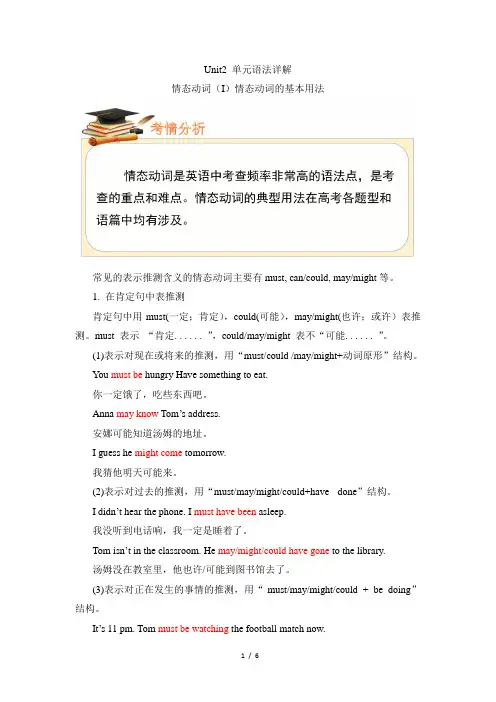
Unit2 单元语法详解情态动词(I)情态动词的基本用法常见的表示推测含义的情态动词主要有must, can/could, may/might等。
1. 在肯定句中表推测肯定句中用must(一定;肯定),could(可能),may/might(也许;或许)表推测。
must 表示“肯定. . . . . . ”,could/may/might 表不“可能. . . . . . ”。
(1)表示对现在或将来的推测,用“must/could /may/might+动词原形”结构。
You must be hungry Have something to eat.你一定饿了,吃些东西吧。
Anna may know Tom’s address.安娜可能知道汤姆的地址。
I guess he might come tomorrow.我猜他明天可能来。
(2)表示对过去的推测,用“must/may/might/could+have done”结构。
I didn’t hear the phone. I must have been asleep.我没听到电话响,我一定是睡着了。
Tom isn’t in the classroom. He may/might/could have gone to the library.汤姆没在教室里,他也许/可能到图书馆去了。
(3)表示对正在发生的事情的推测,用“ must/may/might/could + be doing”结构。
It’s 11 pm. Tom must be watching the football match now.现在是晚上十一点,汤姆肯定正在看球赛。
例1单句填空——I am sure I saw Brian in the park this morning.——You be imagining things. He left for America last night.解析考查情态动词。
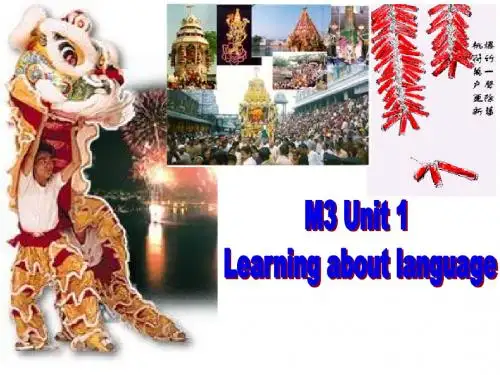
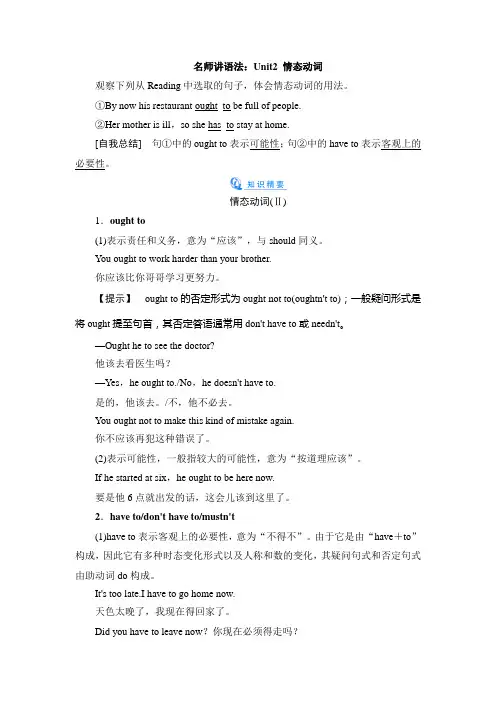
名师讲语法:Unit2 情态动词观察下列从Reading中选取的句子,体会情态动词的用法。
①By now his restaurant ought_to be full of people.②Her mother is ill,so she has_to stay at home.[自我总结]句①中的ought to表示可能性;句②中的have to表示客观上的必要性。
情态动词(Ⅱ)1.ought to(1)表示责任和义务,意为“应该”,与should同义。
You ought to work harder than your brother.你应该比你哥哥学习更努力。
【提示】ought to的否定形式为ought not to(oughtn't to);一般疑问形式是将ought提至句首,其否定答语通常用don't have to或needn't。
—Ought he to see the doctor?他该去看医生吗?—Yes,he ought to./No,he doesn't have to.是的,他该去。
/不,他不必去。
You ought not to make this kind of mistake again.你不应该再犯这种错误了。
(2)表示可能性,一般指较大的可能性,意为“按道理应该”。
If he started at six,he ought to be here now.要是他6点就出发的话,这会儿该到这里了。
2.have to/don't have to/mustn't(1)have to表示客观上的必要性,意为“不得不”。
由于它是由“have+to”构成,因此它有多种时态变化形式以及人称和数的变化,其疑问句式和否定句式由助动词do构成。
It's too late.I have to go home now.天色太晚了,我现在得回家了。
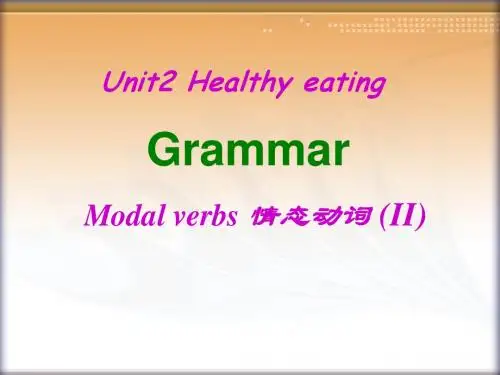
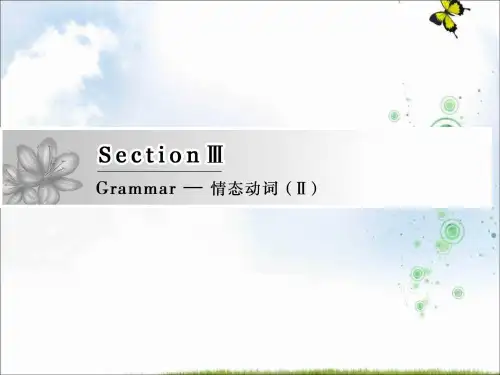
1 必修三unit2语法讲解情态动词用法(二) 、ought to的用法 1. ought to应该”与should相比较ought to语气重,偏重责任、义务、
道德、法律”等方面,意为应该” ①We ought to stop polluti ng n ature.我们应该停止污染大自然。 2. ought to表示较大的可能性。 ①Mary ought to be here soon.玛丽应该很快就来了。
[点津]用ought to表示推断时,语气较肯定,通常指的是一种合乎逻辑的
可能性(与should表推断时相似),有时可译为 很可能;准是”语气比must要弱)。 3. ought to的否定形式为ought not to或ought n't to,其一般疑问句形式是将 ought置于主语前。 ①We ought not to start so late.我们不该这么晚动身。
4. 在反意疑问句中,常省掉to用ought n't或should n't。 ① He ought to take back what he has said, ought n' t/should n't he? 他应该收回他说的话,是吗? 1 — 1.写出下面句中黑体部分的意义 ① To keep fit, weought to lear n more about our body. _____ ① Youought not to do such a thing. _______ ① Itought to be a close game. _______ 1 — 2.用ought完成句子 ①(尔不该责备他。You __________ (scold )him. ①我明天该动身吗? 一 _______________ (_leave [tomorrow?
是的,你应该。一Yes, you ought to
①我们现在应该走,是吗? We ought to go now, ______________ _? 二、have to, don't have to 与 must n't 的用法
1. have to(口语中常用have got to)表示客观需要做的事情,意为 必须;不 得不”有时态、人称和数的变化,其否定式和疑问式应由助动词 do构成。 ① My brother was very ill, so I had to call the doctor in the middle of the ni ght. 我弟弟病了,我不得不半夜里把医生请来。 2
2. have to的否定式为don't have to,表示 没有义务或没有必要做某事 ”意 3
为“不必”,常可以回答 must 提问的一般疑问句 ① You don't have to finish the work now. 你现在没有必要完成这项工作。 [辨析比较 ]
must和have to都有 必须”之意,但二者有区别:
⑴have to侧重客观需要,而must表示说话人的主观看法;
⑵have to有时态、人称和数的变化,而must只有一种形式;
(3)must的否定式 must n't表示禁止” ① The magaz ines must n't be take n out of the read ing room. 不许把这些杂志拿出阅览室。 即学即练 2 2-1.用 have to 完成句子
I yesterday. They the nuclear radiation. ①我必须马上做吗? —Must I do it at once?
不, 你不必。 —No, _________ . 2-2.选词填空: must, mustn't, have to ①现在我不得不走了 ,因为我妈妈生病了 I __________ go now, for my mother is ill. ①我一定要戒烟。 I ______ stop smoking. ①晚上你一定不能独自出去。 You __________ go out alone at night. ①湖南高考)You _________ buy a gift, but you can if you want to. A.must B.mustn't C.have to D.don't have to 三、need的用法
1.need 作情态动词时 ,后跟动词原形 ,表示“需要;有必要 ”,无人称和数 的变化,多用于否定句、疑问句或条件句中。
①You n eed n't come so ear你不必来这么早。 2.作为实义动词 ,同其他实义动词一样 , 可用于各种句式 ,有时态、人称、 数的变化 ,构成否定句和疑问句时要借助于助动词 do 或 does。
① We don't need to spend more time on it. 我们没有必要在这个事情上花太多的时间。 3— 1.用need或must完成句子
①你现在不必去那儿。You needn't go there now. ①他有必要留在这儿吗? 一 Need he stay here?
是的,他必须。/不,他不必要。一Yes, he must /No, he needn't
①天色太晚了 ,我现在得回家了 It's too late, so I now.
①昨天我不得不离开。 ①他们没有必要担心核辐射。 4
①天津高考)It's quite warm here; we ________ turn the heating on yet. A. could n't B. must n't C. need n't D. would n't 四、情态动词+ have done的用法
1. must have done用于肯定句,表示过去一定做过某事”。 ① How can you be late aga in? You must have overslept. 你怎么又迟到了?你一定是睡过头了。
2. can/could have done—般用于疑问句和否定句中,表示对过去所发生事情
的推测。could have done用于肯定句时,表示本有能力做某事而未做”。 ① He can' t/could n't have watched TV last ni ght, for he knew he would have a test.
昨天晚上他不可能看电视,因为他知道就要考试了。 ① We could have arrived there before dark, but we did n't. 天黑前我们本来能够到那里的,但是没到。
3. should/ought to have done表示 过去本应该做某事而(实际上)没有做”, 含有责备或遗憾的语气;其否定形式表示某种行为不该发生却发生了。 ① You should have told me earlier or I might have gone with them.
你应该早点告诉我,不然的话我就会和他们一块去了。
4. may/might have done表示对过去发生的事情的推测,意为 也许已经做 了某事,可能已经做了某事”,多用在肯定句中,用might时表示语气更加不肯 ^定。 ① If you had studied hard, you might have passed the exam.
如果你努力学习的话,你可能会及格的。 5. need n't have done表示 本不必做某事而实际做了 ”。 ① He is old eno ugh! You n eed n't have solved the problem for him. 他够大了!你根本没必要为他解决问题。
4—1.根据汉语意义,用 情态动词+ have done”填空 ①你肯定看过电影《归来》。 You _________________ the film Comi ng Home.
①史密斯先生不可能去北京了 ,我刚才还在图书馆看见他。 5
Mr.Smith _____________to Beiji ng, for I saw him in the library just now. ①本来他能够通过考试,但是他太粗心了。 He _______________ the exam, but he was too careless. ①以前你应该多进行锻炼的。 You ______________ more exercise before. ①你可能已经在报上看过这个消息。 You ______________ about it in the papers.
①你本不必告诉我这个消息,我已经知道了。 You ______________ me the n ews .I have already known it. ①四川高考)—Why are your eyes so red? You ______ have slept well last night. —Yeah, I stayed up late writ ing a report. A. can't B. must n't C. need n't D. won't
①浙江高考)1 ______ myself more — it was a perfect day. A. should n't have enjoyed B. need n't have enjoyed C. would n't have enjoyed D. could n't have enjo yed ①陕西高考)The children _________ lost in the woods; otherwise, they would have bee n at the lakeside camp as scheduled. A. must have got B. must get C . should have got D . should get ①江西高考)We ____ have bought so much food now that Suzie won't be with us for dinner. A. may not B . n eed n't C . can't D . must n't
①选词填空 1 . You ________ go there alone; it's too dangerous. (mustn't/needn't) 2 . It's so n ear; we ________ have take n a taxi.(should n't/ca n't) 3 . You ___________ have spent so much time playing com-puter games.(must n't/ought n't to) 4. — Shall I leave the room so that you two can talk? —No, you _________ . (must n't/n eed n't) 5 . He _______ have missed the train; he arrived at the train stati on two hours early.(ca n't/must n't) 6 . We'll be very glad if you _________ oin us in going camp in g.(ca n/may) 7 . They __ stay in the office last ni ght because of the sno wstorm.(have to/must) 8 . We ______ have helped him; in that case, he would have bee n able to finish the work.(should/ca n)